What are the symptoms of toxins in your body
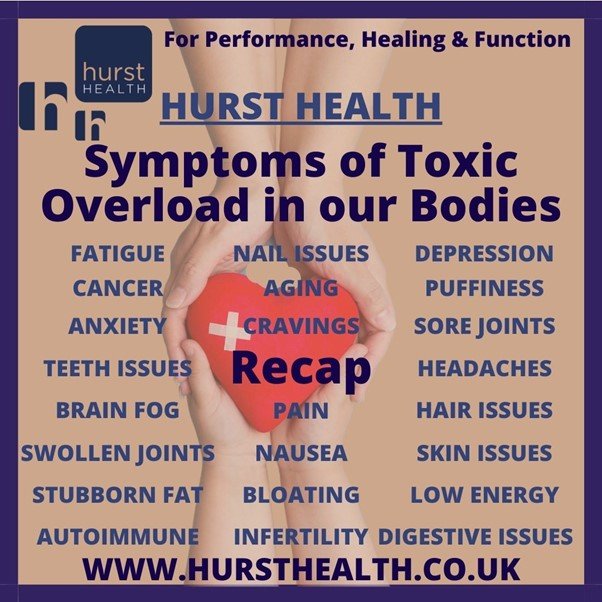
Toxins are harmful substances that can enter your body through the air you breathe, the food you eat, and the water you drink. They can also be produced by your own body as a byproduct of metabolism. While some toxins are harmless, others can cause a variety of health problems, both acute and chronic.
Common symptoms of toxin exposure include:
* Fatigue
* Headaches
* Nausea
* Vomiting
* Diarrhea
* Skin rashes
* Respiratory problems
* Neurological problems
* Immune dysfunction
If you are experiencing any of these symptoms, it is important to see a doctor to rule out other potential causes. If toxins are found to be the cause, your doctor will recommend the best course of treatment.
Recognizing the Signs: Symptoms of Toxin Buildup in Your Body
The human body is remarkably resilient, but prolonged exposure to toxins can overwhelm its natural detoxification processes. Identifying symptoms of toxin buildup can be challenging, as many mimic other illnesses. However, consistent observation of your body's responses can provide valuable clues. It's crucial to remember that these symptoms alone don't definitively diagnose toxin overload; consulting a healthcare professional for diagnosis and treatment is always recommended.
Persistent Fatigue and Low Energy
Chronic fatigue is a common symptom associated with toxin buildup. Toxins can disrupt cellular function, leading to reduced energy production. This fatigue is often different from simple tiredness; it’s a persistent, overwhelming exhaustion that doesn't improve with rest. It can be accompanied by a feeling of brain fog, difficulty concentrating, and impaired cognitive function. Other contributing factors should also be investigated, as fatigue can stem from various underlying conditions.
Digestive Issues and Irregular Bowel Movements
Your gut plays a vital role in detoxification. When overwhelmed by toxins, it can lead to various digestive problems. These include constipation, diarrhea, bloating, gas, and abdominal pain. An unhealthy gut microbiome can further hinder detoxification processes, creating a vicious cycle. A balanced diet rich in fiber and probiotics can support healthy gut function.
Skin Problems: Rashes, Acne, and Eczema
The skin is the body's largest organ and acts as a significant pathway for toxin elimination. When the body is struggling to process toxins, they can manifest as various skin conditions. This might include rashes, acne breakouts, eczema flares, or other skin irritations. The severity of these issues can vary depending on the type and amount of toxin exposure.
Headaches and Migraines
Toxins can irritate the nervous system, leading to frequent headaches or migraines. These headaches can be intense, debilitating, and resistant to typical over-the-counter pain relievers. The severity and frequency might increase with increased exposure to toxins. Other factors that may trigger headaches should always be considered.
Weakened Immune System and Frequent Illnesses
A compromised immune system is a common result of prolonged exposure to toxins. Toxins can interfere with the body's ability to fight off infections, leading to more frequent colds, flu, and other illnesses. This weakened immunity might also manifest as slower recovery times from illness. Supporting your immune system through healthy lifestyle choices is crucial for detoxification.
| Symptom Category | Specific Symptoms | Possible Contributing Factors |
|---|---|---|
| Fatigue | Chronic tiredness, brain fog, low energy | Toxins, sleep deprivation, nutritional deficiencies |
| Digestive Issues | Constipation, diarrhea, bloating, gas, abdominal pain | Toxins, unhealthy diet, gut dysbiosis |
| Skin Problems | Rashes, acne, eczema, irritation | Toxins, allergies, hormonal imbalances |
| Headaches | Frequent headaches, migraines | Toxins, stress, dehydration |
| Immune Weakness | Frequent colds, flu, slow recovery from illness | Toxins, stress, poor diet |
How do you flush toxins out of your body?
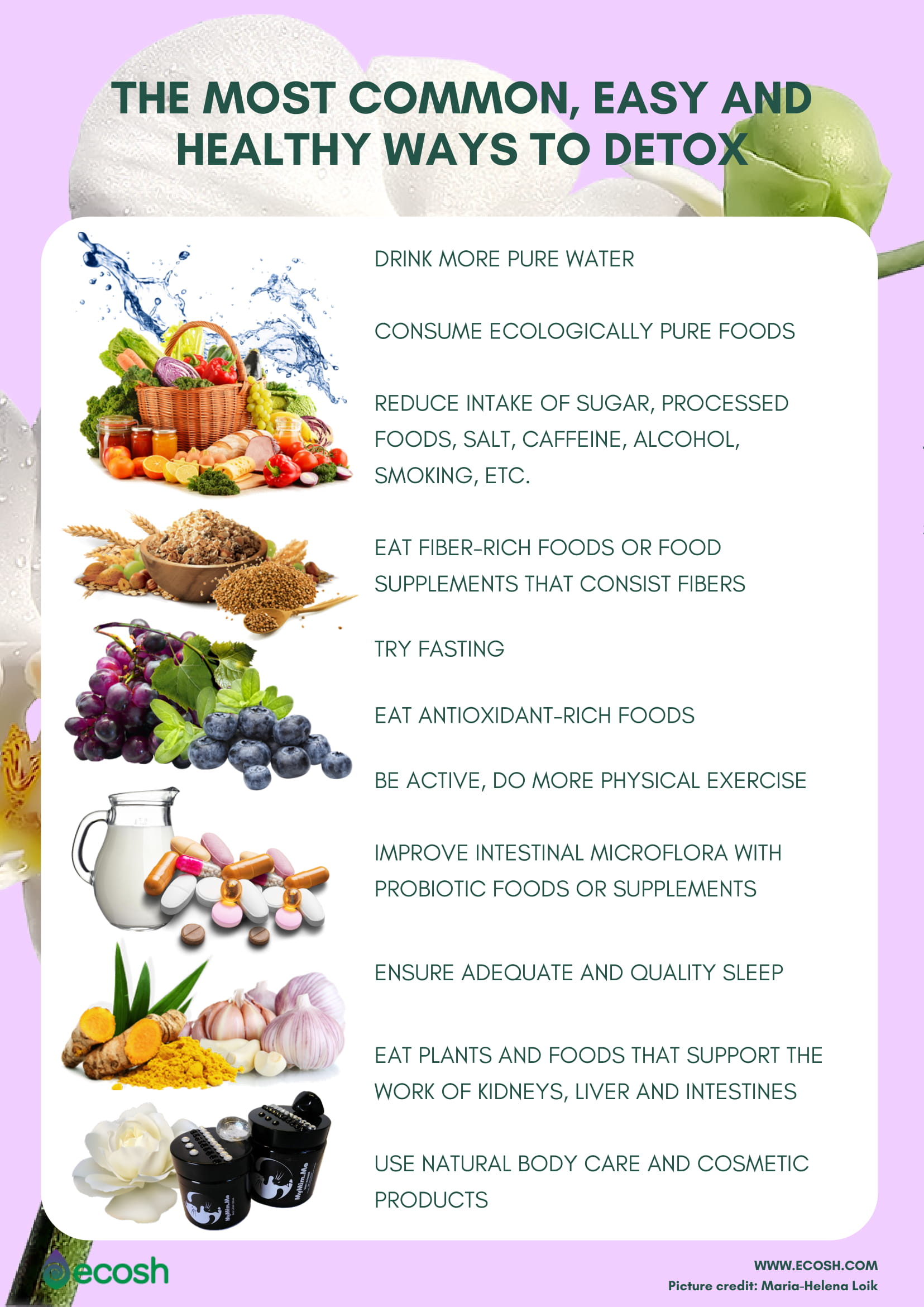
How Do You Flush Toxins Out of Your Body?
The concept of "detoxing" is often marketed with exaggerated claims, but your body has its own efficient systems for eliminating waste products. There's no single magic bullet to flush out toxins, as the term "toxin" is broadly defined and often misused. However, supporting your body's natural detoxification processes through healthy lifestyle choices is key. This involves focusing on your liver, kidneys, and intestines, the primary organs responsible for eliminating waste. These organs work tirelessly to filter out metabolic byproducts and harmful substances. While specific "detox" products are often not necessary or effective, a focus on these key areas will maximize your body's natural detoxification capabilities. Remember to consult a doctor before making significant dietary changes, especially if you have pre-existing health conditions.
Hydration is Key
Water is crucial for flushing toxins. It helps your kidneys filter waste and transports it out of your body through urine. Adequate hydration also supports other bodily functions vital for detoxification, including bowel movements and perspiration. Aim for at least eight glasses of water per day, but this can vary depending on factors such as activity level and climate.
- Drink plenty of water throughout the day.
- Consider adding lemon or cucumber slices to your water for extra flavor and potential health benefits.
- Carry a reusable water bottle to remind yourself to drink consistently.
The Importance of a Balanced Diet
A diet rich in fruits, vegetables, and whole grains provides essential nutrients that support liver and kidney function. These foods are also packed with antioxidants, which help neutralize free radicals – harmful molecules that can damage cells. Conversely, limiting processed foods, sugary drinks, and excessive alcohol reduces the burden on your detoxification organs.
- Eat plenty of colorful fruits and vegetables to maximize antioxidant intake.
- Choose whole grains over refined grains for sustained energy and better digestive health.
- Limit processed foods, red meat, and sugary drinks, which can overload your detoxification systems.
Regular Exercise and Physical Activity
Exercise promotes sweating, which helps eliminate waste products through the skin. Physical activity also boosts blood circulation and lymphatic drainage, further assisting detoxification processes. Regular movement is vital for overall health and can significantly support the body’s natural detoxification abilities.
- Aim for at least 150 minutes of moderate-intensity or 75 minutes of vigorous-intensity aerobic activity per week.
- Incorporate strength training exercises at least twice a week.
- Find activities you enjoy to make exercise a sustainable part of your routine.
Prioritizing Sleep
During sleep, your body undergoes crucial repair and restoration processes, including detoxification. Adequate sleep allows your organs to function optimally, including those responsible for eliminating waste products. Aim for 7-9 hours of quality sleep each night.
- Establish a regular sleep schedule to regulate your body’s natural sleep-wake cycle.
- Create a relaxing bedtime routine to help you wind down before sleep.
- Ensure your bedroom is dark, quiet, and cool for optimal sleep conditions.
Supporting Gut Health
A healthy gut plays a significant role in overall health and detoxification. Your gut microbiome influences immunity and nutrient absorption, which directly impact your body’s ability to eliminate waste. Maintaining a healthy gut flora, through a balanced diet rich in fiber and fermented foods (like yogurt or kefir), is important.
- Consume foods high in fiber, such as fruits, vegetables, and whole grains.
- Incorporate fermented foods like yogurt, kefir, and sauerkraut into your diet.
- Consider a probiotic supplement, but only after consulting with a doctor.
How do you know you have toxins in your body?
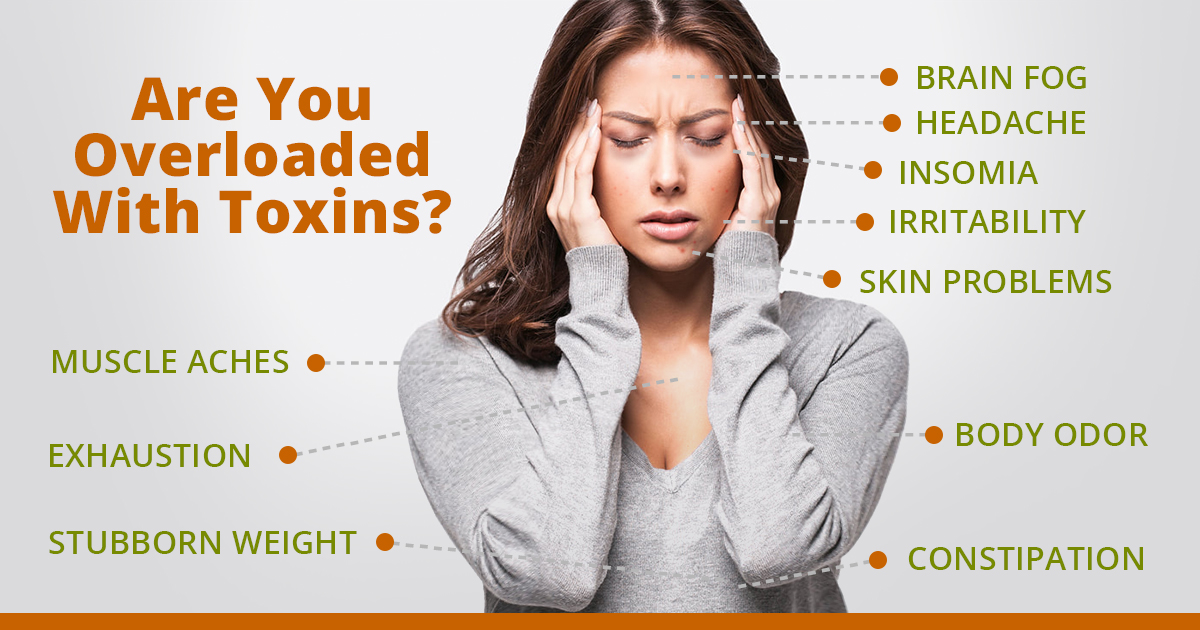
There's no single, definitive way to know you have "toxins" in your body because the term "toxin" is often misused and lacks a precise medical definition in this context. The body has natural mechanisms to eliminate waste products. What people often refer to as "toxins" are usually byproducts of metabolism or substances from the environment that the body is processing or struggling to eliminate. Experiencing symptoms often attributed to "toxins" might indicate an underlying medical condition requiring professional diagnosis rather than a simple toxicity issue. It's crucial to consult a doctor for any persistent health concerns instead of self-diagnosing based on generalized information about toxins.
Common Symptoms Often Associated with Toxin Buildup (But Could Indicate Other Issues)
Many symptoms are often linked to "toxin buildup," but these are general and could be caused by various health problems. It's crucial to consult a doctor to determine the root cause. Do not self-diagnose.
- Fatigue: Persistent tiredness, even after adequate rest.
- Headaches: Frequent or severe headaches.
- Skin Issues: Rashes, acne, eczema, or other skin irritations.
Digestive Problems as Potential Indicators
Issues with your digestive system are frequently connected to the idea of "toxin buildup," but a variety of conditions can lead to digestive distress. See a doctor for persistent problems.
- Constipation: Difficulty passing stools.
- Bloating: Feeling of fullness and distension in the abdomen.
- Diarrhea: Loose, watery stools.
The Role of Inflammation and Immune Response
Inflammation is a natural bodily response, but chronic inflammation is linked to many diseases. While often associated with toxins, inflammation itself is a complex process with numerous causes. Consult a healthcare provider for persistent inflammation.
- Joint Pain: Aching, stiffness, or swelling in the joints.
- Frequent Infections: Recurring colds, flu, or other illnesses.
- Chronic Pain: Persistent pain not directly related to an injury.
Mental and Neurological Symptoms
Brain fog, difficulty concentrating, and mood changes are sometimes linked to the concept of toxin overload. However, these symptoms can arise from various conditions, including mental health disorders. Seek professional medical advice if you experience these symptoms.
- Brain Fog: Difficulty concentrating or thinking clearly.
- Mood Swings: Unpredictable changes in mood or emotions.
- Anxiety or Depression: Persistent feelings of anxiety, sadness, or hopelessness.
Environmental Exposures and Potential Health Effects
Exposure to certain environmental toxins, such as heavy metals or pesticides, can cause specific health problems. These require professional medical evaluation and treatment.
- Exposure to heavy metals: Symptoms can vary greatly depending on the metal and level of exposure.
- Pesticide exposure: Can lead to neurological, respiratory, or skin problems.
- Air pollution: Can trigger respiratory issues and exacerbate existing conditions.
What can cause a build up of toxins in the body?
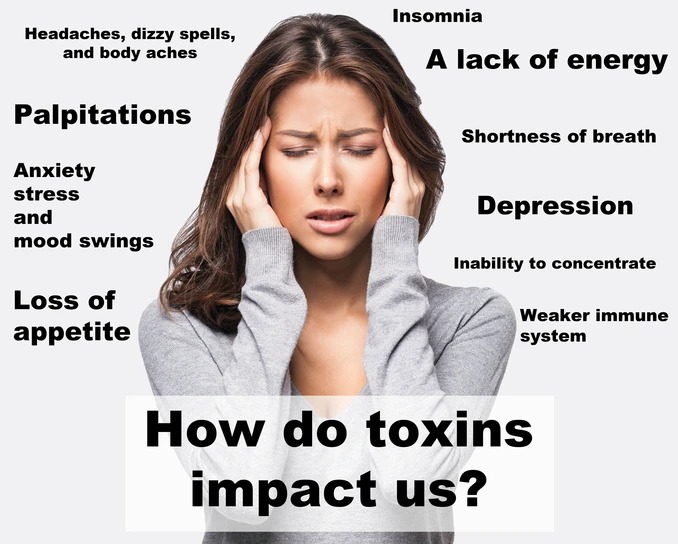
What Can Cause a Build-Up of Toxins in the Body?
A build-up of toxins in the body, also known as toxic overload, can result from a variety of factors. It's important to understand that the body has natural detoxification mechanisms, but these can be overwhelmed by excessive exposure to toxins or impaired by underlying health conditions. The concept of "toxins" itself is broad, encompassing substances that can harm the body at certain concentrations. While some toxins are readily identifiable, others are less obvious and their impact can be subtle and cumulative.
Poor Diet
A diet lacking in essential nutrients and rich in processed foods, unhealthy fats, sugar, and artificial additives can significantly contribute to toxin buildup. These foods often contain substances the body struggles to process efficiently, leading to an accumulation of metabolic waste products. Furthermore, a diet deficient in fiber can hinder the elimination of toxins through the digestive system. Consuming an excess of processed foods places a considerable strain on the liver and kidneys, the body's primary detoxification organs.
- High intake of processed foods, saturated fats, and sugars.
- Lack of fiber leading to inefficient bowel movements and toxin reabsorption.
- Deficiency in essential vitamins and minerals that support detoxification processes.
Environmental Toxins
Exposure to environmental pollutants is a major contributor to toxin accumulation. This includes air pollution from vehicle emissions and industrial processes, exposure to pesticides and herbicides in food and water, and contact with heavy metals from various sources. These toxins can enter the body through inhalation, ingestion, or skin absorption, accumulating in tissues and organs over time. Reducing exposure to environmental toxins is challenging but vital for minimizing their impact.
- Air pollution from industrial emissions and vehicle exhaust.
- Water contamination from industrial runoff and agricultural chemicals.
- Exposure to heavy metals through contaminated soil, water, or food.
Lack of Physical Activity
Regular exercise plays a crucial role in detoxification by supporting lymphatic drainage and improving circulation. The lymphatic system is responsible for removing waste products and toxins from the body. Sedentary lifestyles can impair lymphatic function, leading to a build-up of toxins. Physical activity also helps to support liver and kidney function, enhancing their ability to process and eliminate waste products.
- Impaired lymphatic drainage due to lack of movement.
- Reduced circulation hindering the removal of toxins from tissues.
- Decreased liver and kidney function impacting detoxification processes.
Chronic Stress
Chronic stress has a significant impact on the body's detoxification pathways. When under stress, the body releases cortisol and other hormones that can disrupt normal metabolic processes and overwhelm the detoxification systems. Prolonged stress can weaken the immune system, making the body more vulnerable to the harmful effects of toxins. Effective stress management techniques are essential for supporting the body's natural detoxification capabilities.
- Increased cortisol levels disrupting metabolic balance.
- Weakened immune system decreasing the body's ability to combat toxins.
- Impaired gut health, contributing to increased intestinal permeability and toxin absorption.
Underlying Medical Conditions
Certain medical conditions can impair the body's ability to eliminate toxins effectively. Liver and kidney diseases, for instance, directly affect the organs primarily responsible for detoxification. Autoimmune diseases and other chronic conditions can also indirectly impact detoxification by creating an inflammatory environment within the body. Addressing underlying health issues is crucial for restoring the body's natural detoxification processes.
- Liver and kidney diseases directly impairing detoxification functions.
- Autoimmune disorders causing chronic inflammation that hinders detoxification.
- Gastrointestinal disorders impacting nutrient absorption and toxin elimination.
What diseases are caused by toxins?
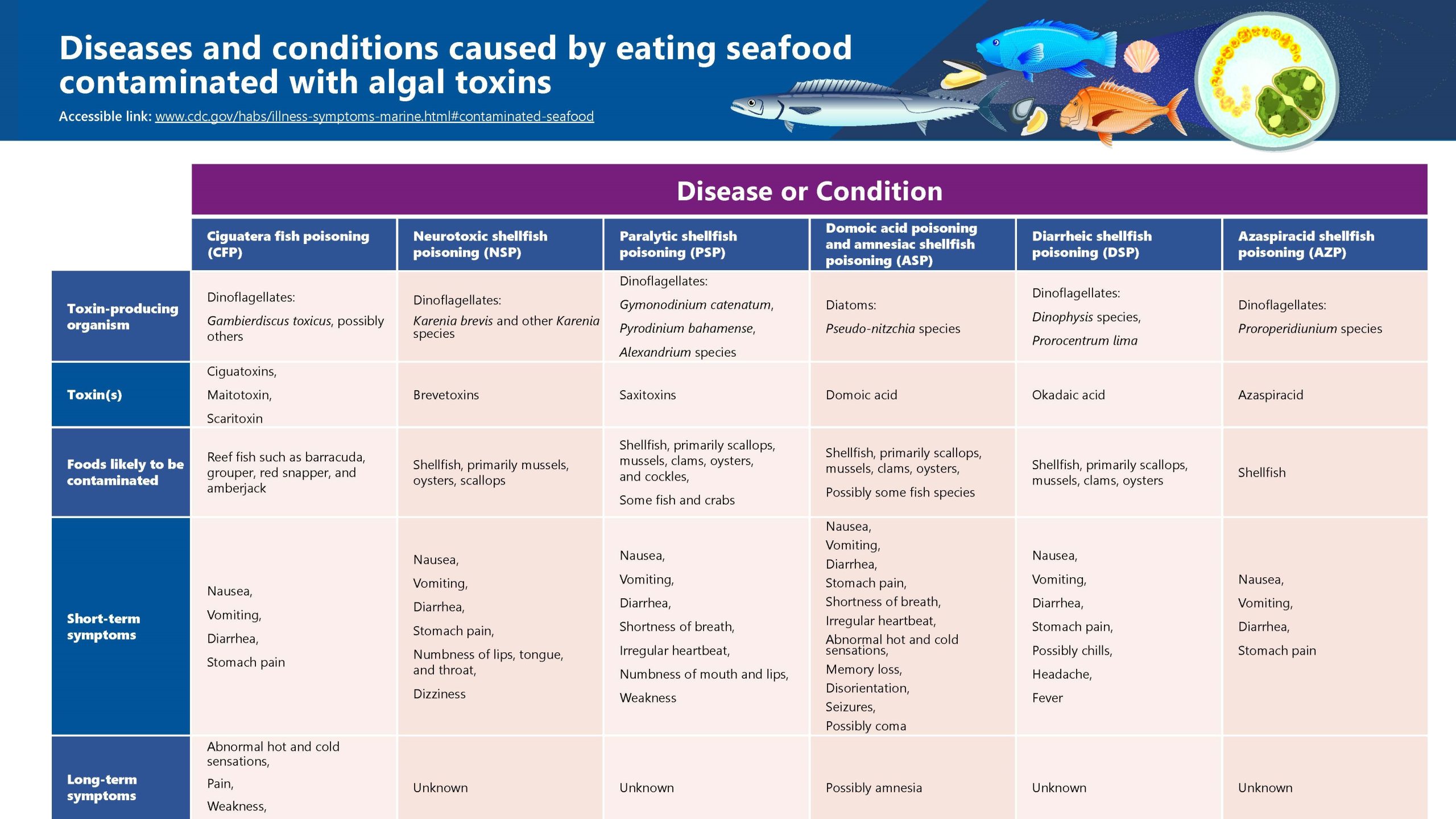
What Diseases are Caused by Toxins?
Many diseases are caused by toxins, which are poisonous substances produced by living organisms or by chemical processes. These toxins can affect various systems in the body, leading to a wide range of illnesses. The severity of the disease depends on several factors including the type of toxin, the amount of exposure, the route of exposure, and the individual's overall health. Some toxins cause acute, immediate effects, while others cause chronic illnesses that develop over time. Furthermore, the effects can range from mild discomfort to severe organ damage and even death.
Types of Toxins and Associated Diseases
Toxins can be broadly classified into several types, each causing different diseases. Bacterial toxins, such as those produced by Clostridium botulinum (botulism) and Staphylococcus aureus (food poisoning), cause a range of illnesses. Fungal toxins (mycotoxins) like aflatoxins found in contaminated food can lead to liver cancer and other health problems. Plant toxins, such as those in poison ivy or hemlock, cause allergic reactions or more severe systemic toxicity. Animal toxins, including snake venom and scorpion venom, cause immediate and sometimes fatal effects. Finally, synthetic toxins, created by humans, like heavy metals (lead, mercury) and industrial chemicals, pose significant health risks.
- Botulism: Caused by Clostridium botulinum neurotoxin.
- Staphylococcus food poisoning: Caused by toxins produced by Staphylococcus aureus.
- Aflatoxicosis: Caused by aflatoxins produced by certain fungi.
Neurological Diseases Caused by Toxins
The nervous system is particularly vulnerable to the effects of toxins. Heavy metals like mercury and lead can cause neurological damage, leading to developmental delays in children, cognitive impairment, and even paralysis. Certain pesticides and industrial solvents also have neurotoxic effects, causing symptoms ranging from headaches and dizziness to more severe conditions like Parkinson's disease and Alzheimer's disease (although the exact causative role of environmental toxins in these diseases is often complex and debated).
- Mercury poisoning: Can cause tremors, cognitive impairment, and peripheral neuropathy.
- Lead poisoning: Can cause developmental delays, learning disabilities, and behavioral problems.
- Organophosphate poisoning: Can cause acute cholinergic crisis leading to respiratory failure.
Hepatotoxic Diseases
The liver is a major detoxification organ, and it is therefore susceptible to damage from toxins. Alcohol abuse is a leading cause of liver disease, as the body metabolizes alcohol into toxic byproducts. Certain medications and herbal supplements can also cause liver damage (hepatotoxicity). Additionally, exposure to industrial chemicals such as carbon tetrachloride can have severe hepatotoxic effects.
- Alcoholic liver disease: Ranges from fatty liver to cirrhosis and liver failure.
- Drug-induced liver injury: Can be caused by numerous medications, resulting in hepatitis or liver failure.
- Aflatoxin-induced liver cancer: A long-term consequence of aflatoxin exposure.
Cardiovascular Diseases Linked to Toxins
Exposure to certain toxins can increase the risk of cardiovascular diseases. Air pollution containing particulate matter and ozone has been linked to an increased risk of heart attacks and strokes. Exposure to heavy metals such as cadmium and arsenic has also been associated with increased cardiovascular morbidity and mortality. Furthermore, some industrial chemicals are suspected to disrupt the endocrine system, potentially impacting cardiovascular health.
- Hypertension: High blood pressure linked to environmental toxin exposure.
- Coronary artery disease: Risk may be elevated by exposure to air pollution and certain toxins.
- Stroke: Exposure to particulate matter and other air pollutants may increase risk.
Immunotoxic Diseases
The immune system can be significantly compromised by exposure to toxins. Exposure to certain pesticides and industrial chemicals can weaken the immune system, making individuals more susceptible to infections. Heavy metals can also suppress immune function, leading to increased vulnerability to diseases. Moreover, some toxins can trigger autoimmune diseases, where the immune system attacks the body's own tissues.
- Immunodeficiency: Weakened immune response due to toxin exposure.
- Autoimmune diseases: Some toxins can trigger or exacerbate autoimmune responses.
- Increased susceptibility to infections: A weakened immune system increases vulnerability to various pathogens.
What are the common symptoms of toxin buildup in the body?
The symptoms of toxin buildup are often nonspecific, meaning they can mimic many other health conditions. This makes it difficult to definitively diagnose toxin overload without proper testing. However, some common signs frequently cited include persistent fatigue, often described as an overwhelming tiredness that doesn't improve with rest. Another common indicator is headaches, which may be frequent, severe, or persistent, and not relieved by over-the-counter pain medications. Many individuals experience digestive issues such as bloating, constipation, diarrhea, or abdominal pain. These digestive problems may stem from the body's inability to efficiently process and eliminate toxins. Skin problems are another frequent symptom, ranging from rashes and acne to eczema and other inflammatory skin conditions. This is because the skin is a major organ of elimination, and when it's overburdened with toxins, it can manifest as various dermatological problems. Furthermore, some individuals report experiencing brain fog or difficulty concentrating, a condition characterized by mental sluggishness and impaired cognitive function. Weight fluctuations, unexplained weight gain or loss, can also be a sign, as toxins can disrupt the body's metabolism and hormonal balance. Finally, muscle aches and pains, particularly persistent or widespread pain without a clear cause, can also be attributed to toxin overload. It's crucial to understand that the presence of one or more of these symptoms does not automatically mean a person has a significant toxin overload. It's vital to consult a healthcare professional for proper diagnosis and treatment.
How can I tell if my symptoms are related to toxins, or something else?
Differentiating symptoms caused by toxin buildup from other underlying health conditions is challenging because the signs are often vague and nonspecific. Many illnesses share similar symptoms, making self-diagnosis unreliable. For example, fatigue can be a symptom of numerous conditions, ranging from simple tiredness to chronic illnesses like thyroid problems or anemia. Similarly, headaches can be caused by stress, dehydration, or migraines, amongst other factors. To determine if your symptoms are indeed related to toxins, a thorough medical evaluation is necessary. This evaluation should include a comprehensive physical examination, a detailed review of your medical history, lifestyle, and diet, and possibly blood tests to assess your overall health and identify any deficiencies or abnormalities. It's important to note that there are no universally accepted diagnostic tests specifically for "toxin overload." However, specific tests might be used to investigate potential sources of toxins or related problems, like heavy metal testing or stool analysis. It's vital to discuss your concerns and symptoms with a qualified healthcare professional who can help determine the underlying cause of your symptoms through a combination of investigation and clinical judgment. Self-treating based solely on suspected toxin buildup is highly discouraged and could potentially delay proper diagnosis and treatment of a more serious condition.
Are there specific types of toxins that cause more noticeable symptoms?
Yes, different types of toxins can produce varying and sometimes more readily identifiable symptoms. Exposure to heavy metals like lead, mercury, or cadmium can lead to a range of neurological problems, including tremors, cognitive impairment, and peripheral neuropathy (nerve damage). Furthermore, heavy metal toxicity can manifest as kidney and liver damage, shown through altered blood tests and potentially impacting these organ's function. Exposure to pesticides and herbicides can cause a variety of symptoms, including headaches, nausea, fatigue, and skin irritation. In severe cases, these can lead to more serious problems such as neurological disorders and respiratory problems. Environmental toxins such as air pollutants and mold can trigger allergic reactions, respiratory problems (like asthma), and exacerbate existing conditions like eczema or other allergies. Food toxins such as mycotoxins (produced by fungi), or bacterial toxins can cause digestive upset, including vomiting, diarrhea, and abdominal cramps. Chemical toxins from household cleaning products, personal care products, or industrial exposure can have a broad range of effects, depending on the substance and level of exposure. This can range from mild skin irritation to severe organ damage. The severity and nature of the symptoms depend heavily on the type of toxin, the level of exposure, and the individual's susceptibility. Again, proper medical evaluation is critical to determine the specific toxin(s) involved and the appropriate course of action.
What are some natural ways to help detoxify my body?
While there's no "miracle cure" for toxin overload, supporting your body's natural detoxification processes through lifestyle changes can be beneficial. A healthy diet rich in fruits, vegetables, and whole grains provides essential nutrients that support liver and kidney function, the primary organs of detoxification. Hydration is crucial, as water aids in flushing out toxins through urine and sweat. Consider increasing your water intake, aiming for at least eight glasses a day. Regular exercise supports lymphatic drainage, a crucial component of the body's detoxification system. Even moderate exercise like brisk walking or cycling can make a significant difference. Prioritizing adequate sleep allows the body to repair and rejuvenate itself, improving its capacity for detoxification. Aim for 7-9 hours of quality sleep per night. Stress reduction techniques like meditation, yoga, or deep breathing exercises can help mitigate the negative impact of stress hormones, which can disrupt the body's detoxification processes. Finally, reducing your exposure to environmental toxins as much as possible is essential. This may involve making choices like using natural cleaning products, avoiding processed foods, and reducing exposure to air pollution. However, it’s important to remember that these methods are supportive measures and don't replace medical care. If you suspect you have a significant toxin burden, consult a healthcare professional for a proper diagnosis and to develop a tailored approach to support your body's natural detoxification pathways. Do not attempt extreme or potentially dangerous detox methods without professional guidance.
Deja una respuesta